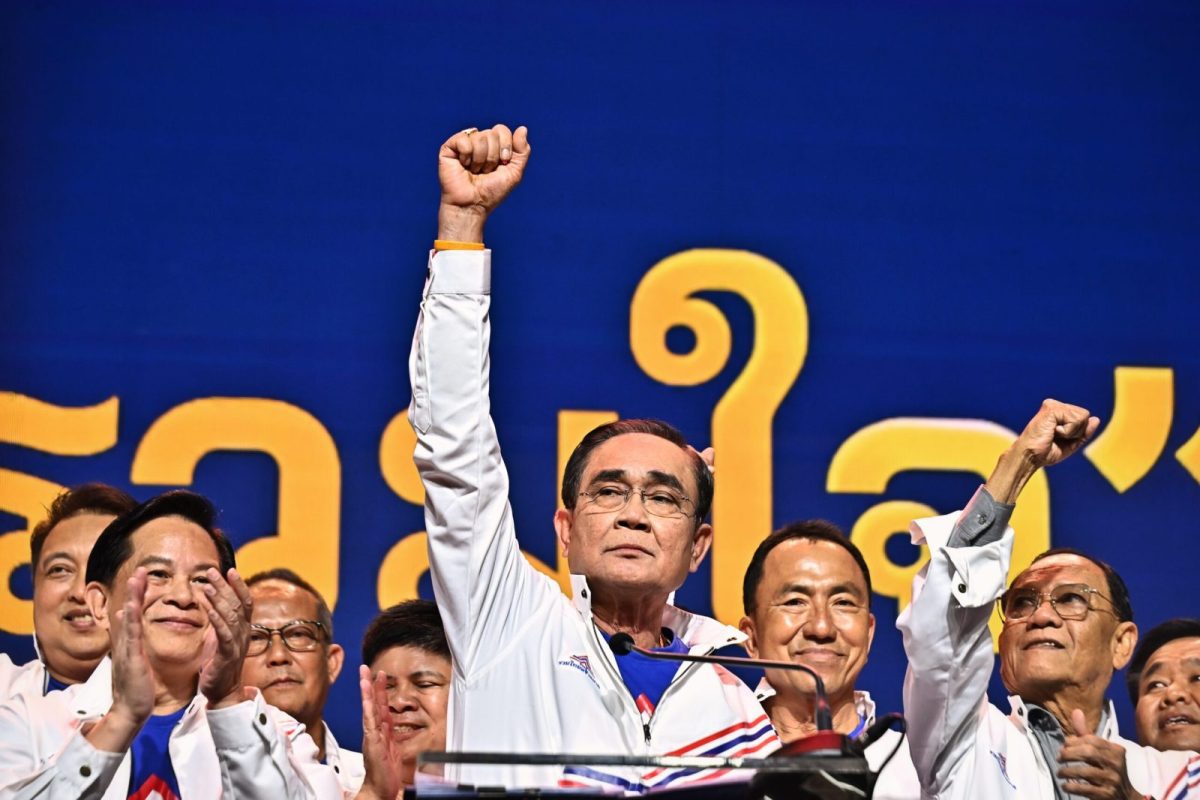Global Courant 2023-05-12 14:07:30
It is clear that self-awareness is not Prayut Chan-ocha’s forte as the Thai prime minister warns of a “black hole of conflict” in what was once one of Southeast Asia’s most promising economies.
The conflict Prayut warns is assured if voters support opposition groups in Sunday’s general election, he claims. Yet many economists agree that Prayut’s nine years in power have been their own black hole of dysfunction and complacency.
In May 2014, the general-turned-politician led the latest military junta to seize power in Bangkok. Since the 1930s, Thailand has experienced at least 28 coups d’état. And like most junta leaders before him, Prayut had no real plan to improve government efficiency or raise living standards.
In fact, the last nine years of political stalemate were also preceded by eight years of complacency. In a previous coup in 2006, then Prime Minister Thaksin Shinawatra dismissed the door. After that, a revolving door of governments came and went with little or no upgrades to improve Thailand’s economic game.
This lost period will come back to haunt the kingdom no matter who wins on May 14 – be it Prayut’s United Thai Nation Party or one of the opposition parties. This political turmoil over the past 17 years has greatly increased Thailand’s chances of falling into the dreaded “middle-income trap”.
“Thailand is a middle-income economy that is at risk of having its lunch eaten by lower-income rivals competing in similar production segments – especially Vietnam,” warns economist Vincent Tsui of Gavekal Research.
As generals conspired and politicians faltered, Tsui says: “Thailand has experienced steady deindustrialisation, with both export and investment shares of GDP falling, while those for tourism-related services have risen – though badly hit by the pandemic.”
The real black hole to worry about here is how China, India, Indonesia, Vietnam and other competitors got their innovative acts together. The pace at which only Indonesia is making tech “unicorn” startups should panic officials in Bangkok.
So are the ways in which Vietnam is arguably the biggest winner of the US-China trade war. Vietnam gains a disproportionate share of the factories, jobs and long-term investments fleeing the mainland.
To understand why Thailand is stuck, says Khon Kaen University economist Peerasit Kamnuansilpa, one has to recognize that it is dominated by central economic development agencies, which provide economic incentives to big businesses, investors and high net worth entrepreneurs in the form of income and capital gains. tax benefits combined with other indirect benefits such as business protection or market monopolies.
Prime Minister Prayut Chan-ocha is flanked by CP Group Chairman Dhanin Chearavanont (2nd right) and ThaiBev founder billionaire Charoen Sirivadhanabhakdi (L) at Government House in a file photo. Photo: AFP Forum / Chanat Katanyu
However, this latest experiment with trickle-down economics is not working. “Perhaps the most important obstacle to long-term economic prosperity is institutional weaknesses,” notes Peerasit. “All economic development policies are formulated and strategic choices are made by heavy-handed central government agencies.”
In other words, Thailand has a lot of economic hardware but lacks the software needed to compete in the 2020s. To tackle the problem, says economist Upalat Korwatanasakul of Waseda University, the government should “consider policies that can address the problems of insufficient transfer of knowledge and technology and a lack of capabilities of local businesses, as these are the main causes of the limited upgrade. ”
The problem, of course, is that the last few Thai governments have been so busy fighting to keep their jobs that they haven’t been doing their jobs.
Tsui van Gavekal adds that “Thailand used to be a major exporter of electronics products, but its global share has shrunk to about 1.7% from 2.2% a decade ago. During the same period, Vietnam posted a five-fold increase in profits to control 5% of this market.”
Cars are a bright spot for Thailand, which remains Southeast Asia’s largest car exporter and the 10th largest in the world with a global export share of 2.1% over the past five years. However, there are two major problems here.
First, as Tsui explains, the real challenge is that this position has been built around the internal combustion engine, and as for many auto-producing countries, there is a risk that China in particular will steal a march when it comes to dominating electric vehicle production. .
The other: Neighbors like the Philippines are lobbying automakers to migrate to the greater Manila region. Indonesia is also positioning itself for large-scale production of electric vehicles.
Admittedly, Thailand has managed to secure investment from Chinese automakers such as BYD, Great Wall Motor and SAIC Motor, which are seeking some offshore production capacity.
“Still,” says Tsui, “Chinese automakers have well-developed onshore supply chains and will be less inclined to outsource large volumes of production as Thailand does not offer much cost advantage. In reality, the auto industry in Thailand is in a defensive stance and the risk of losing its existing share and seeing a new wave of deindustrialization.”
A worker at the Ford Thailand factory in Rayong province, east of Bangkok. Photo: Facebook
Thailand’s declining competitiveness has left voters wondering what Prayut was thinking when he came to power in 2014. Critics argue that inequality increased while many freedoms disappeared during his supervision. The fruits of Thailand’s gross domestic product (GDP) are shared by an ever-shrinking elite.
While young Thais worry about their futures, former rich try to make a comeback. Exhibit A: The Shinawatra Family.
Since his ouster in a coup in 2006 and subsequent criminal convictions, Thaksin Shinawatra has lived in self-exile. So is his sister, Yingluck, also a former prime minister, who was impeached by the country’s Constitutional Court in 2014.
Now Thaksin’s daughter, Paetongtarn Shinawatra, has her own date with destiny. On May 14, she hopes to bring her father’s opposition party Peua Thai to power. And join her in restoring the tarnished legacy of her billionaire father who played an outrageous role in Thailand’s current chaos.
Thaksin first came to power with a claim that Donald Trump would later make to win the US presidency: As a wildly successful CEO, I know how to solve the country’s problems.
This was in 2001, when the shadow of the Asian financial crisis of 1997-1998 hung over Thai politics. In the midst of great turmoil and economic pain, the very wealthy Thaksin first embraced nationalist and then populist rhetoric to achieve an unlikely, pro-poor folk hero status.
After five years, voters realized they had elected Thai Silvio Berlusconi. Like the Italian billionaire turned prime minister, Thaksin also weakened government institutions in the service of his telecom empire. He, Berlusconi-style, funneled massive amounts of stimulus money into rural areas to counter the skepticism of urban elites.
But the urban-rural divide that exacerbated Thaksin blew him up in 2006. Since that coup, a revolving door of governments has simply taped the cracks shut.
Former Prime Minister Thaksin Shinawatra set in motion the kingdom’s populist death spiral. Image: Agencies
Instead of reviving institutions, increasing transparency and investing in innovation, government after government boosted GDP with short-term plans. This sugar high after sugar high has done little to prepare Thailand for the digital age that is now reshuffling Asia’s economic hierarchy.
When it was Prayut’s turn to give the government a chance, he forgot what American political guru James Carville said two decades earlier: “It’s the economy, you idiot.”
Carville was an adviser to then US President Bill Clinton, under whose watch the Asian crisis took place. But nine years later, Prayut is giving coup leaders a bad name for a whole new reason. When generals seize power, they tend to claim that the motive is to restore order and achieve great things.
There have been hardly any reforms since the early 2000s. All the while, problems bubble under the surface that the government is too distracted or economically inept to address. Prayut’s Eastern Economic Corridor (EEC) project, which was designed to attract multinational investment in “4.0” industries, has been a flop by most assessments due to a lack of local talent.
Household debt, meanwhile, reached 90% of GDP in 2021, one of the highest levels in Asia. Too many governments in the past have promoted household borrowing for consumption as a short-term solution to economic headwinds. Now the hangover.
Economist Bert Burger of Atradius calls the “heavy household debt” a “persistent risk to the Thai economy”. He adds that “in the long run,” “high household debt could affect private consumption and derail the financial sector in the face of rising interest rates or falling incomes.”
It is therefore no wonder that almost all political parties, including Prayut and Paetongtan, campaign on populist promises, including de facto cash transfers, which they are unlikely to be able to implement, legally or fiscally.
Ongoing election campaigns have also been dangerous to Bangkok’s fiscal health, Bank of Thailand officials warn. With inflation near its 14-year high, the government continues to prioritize subsidies to ease the pain of rising living costs over supply-side reforms to boost productivity and economic efficiency.
“We should avoid policies that promote bad incentives,” says economist Somchai Jitsuchon, a member of the BOT Tariff Panel.
A sad Thai is holding a Thai baht bill. Photo: NurPhoto via AFP Forum/Anusak Laowilas
However, the bigger problem is that none of the 10 governments who have managed the economy since 2001 addressed the risk of the middle-income trap that can no longer be ignored. This pitfall is defined by gains in per capita income that hover around $10,000. Thailand is now at $8,100according to figures from the International Monetary Fund.
Another problem: Thailand’s Southeast Asian neighbors are accelerating their efforts to boost competitiveness as Thailand steps into place. As the temperature continues to rise, Indonesia, Malaysia, the Philippines, Vietnam and other multinationals are lobbying to change direction, some of which are major employers in Thailand.
This Thai election should be a time to chart a new course for the one-time Asian tiger economy. Unfortunately, it seems that the vicious circle that Bangkok entered two decades ago will continue to worsen the outlook for the next two decades.
Shawn W. Crispin reported from Bangkok.
Similar:
Loading…







